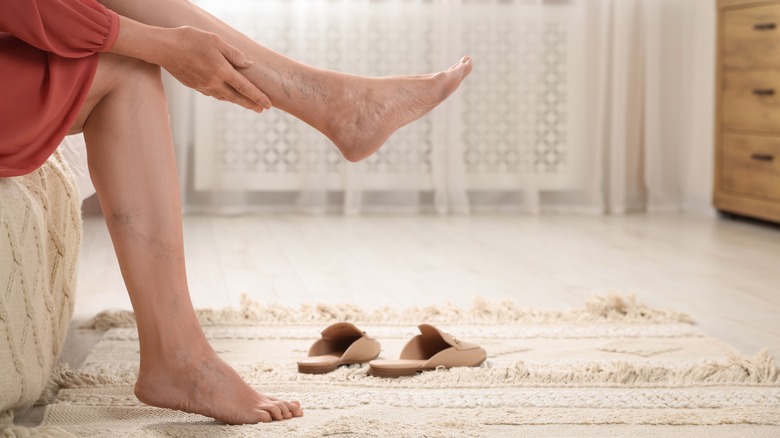If You Don't Eat Enough Protein, This Is What Happens To Your Weight
Protein is a vital macronutrient for your body, maintaining and repairing tissues, producing enzymes and hormones, and supporting the overall structure and function of the body. You have more than 10,000 types of proteins in your body, making up body elements such as your hair, skin, and nails. Because your body can't store the amino acids that make up protein, you'll need to continually replenish your body with protein throughout the day rather than taking it all in at once.
You should try to get at least 0.36 grams of protein for each pound of body weight, which comes to about 54 grams for someone weighing 150 pounds. Although you can probably get that amount from two scoops of protein powder, you can spread out your protein to about 15-20 grams for breakfast, lunch, and dinner, says UCLA Health. Most people in the United States — particularly males — get more than enough protein in their daily diet. However, older adults and people with cancer might have trouble eating and might not meet their protein needs. While this malnutrition might result in weight loss, eating too little protein might have you retain water weight in your legs, feet, and hands (per WebMD).
Your body holds water in your tissues
Protein also helps your body recover from illness, according to the London Health Sciences Centre. When you're sick, you quickly deplete your levels of albumin, which is typically the most abundant type of protein in your body. Doctors know the severity of your illness depending on your albumin levels. While protein will pull water through your blood vessels, the water travels to your tissues if you don't have enough protein. This is what's known as "edema."
Edema results in swelling not only in your arms and legs but also in your abdomen. This can cause your skin to stretch or appear shiny. If you press into the skin and it creates a temporary dimple, it might indicate edema. People with edema might find it uncomfortable to walk because of the heaviness in their legs, according to WebMD. Not having enough protein isn't the only cause of edema. If you're pregnant, having surgery involving your lymph nodes, or suffering from a long-term illness, you could be at risk for edema, notes the Mayo Clinic.
Other concerns from not having enough protein
While fruitarian diets or juice fasts might help you lose weight in the short term, you'll miss out on the necessary protein to sustain much of your body's functioning. The first sign you're not getting enough protein is having brittle hair and nails since they are made from proteins. Protein also helps you feel full after eating, so a diet low in protein might have you reaching for more food shortly after meals. Because protein is needed to help you recuperate from illness, a lack of protein could make you sick more often or leave you sick for longer (per UCLA Health).
If you don't get enough protein, you might also notice changes in your mood. Amino acids such as tryptophan, tyrosine, and phenylalanine eventually form into the essential neurotransmitters serotonin, dopamine, and norepinephrine. Without these neurotransmitters, you could feel anxious or depressed. Eating a diet low in protein also puts you at a greater risk of losing essential muscle, particularly if you're an older adult. This might leave you feeling weak and unable to maintain your balance, says WebMD.



